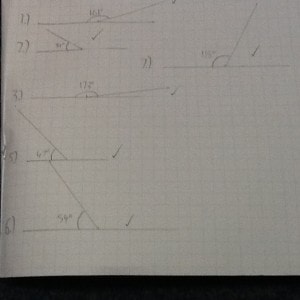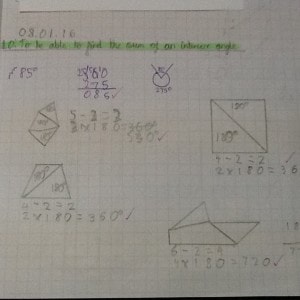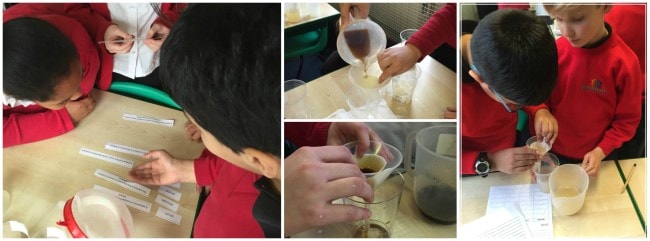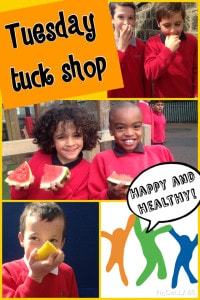This week, by Jennifer and Ethan
This week, Jennifer and Ethan have spent some time reflecting on our learning over the last week.
English
This term in English we have been planning and writing news articles about the three little pigs but this time the wolf is innocent. We have already done the main news and the background. This a piece from Bailey’s writing:
At approximately 15:17, Bradley and Albert Pig were left no option but to run to their sister’s house. Mr A.Wolf, who claimed he wanted to invite them to his house welcoming party, said the attack on Wheat Dale Farm was accidental.
Maths
In maths we have been focusing on drawing and calculating angles – including missing interior angles. We have also learnt about symmetry and circles!
Here are some examples of our learning (drawing angles and finding the total of the interior angles of a shape):


Next week, we will be starting our new topic: Life!
What’s the ‘solution’ to our problem?
Last week, Y5 explored which solvents (substances) would create a solution when added to a solvent (water).
If you can’t see any of the particles from the solvent (salt, sugar, rice, sultanas etc…), it has created a solution. If the particles of the solvent sink to the bottom, this is called a residue and a solution has not been created.
Can you get the solvent back once it has been mixed into the solute (water), even if it made a solution?
We sieved and filtered our variables to find out whether we got any back.

The rice and sultanas could be separated from the water and some things were trapped by the filter but lots of our tests still haven’t separated. We’re now leaving them to evaporate to see if anything is left in the cup once the water has all gone.
15 January 2016
This week’s homework is Creative and is due on Wednesday 19 January.
What is Life?
Our new topic will be ‘Life’:
- How do we know about ‘Life’ in the past?
- How have species changed over time?
- What different types of animals are there?
- How do animals change throughout their life?
- What keeps humans alive?
Explore what you think ‘life’ is. Are there any things that you would argue aren’t experiencing ‘life’ as you understand it? Think about how you can present your views in a creative way.
You could prepare a presentation, create an image, write a story outlining what ‘Life’ is… Enjoy!
15 January 2016
This week’s Practice Makes Perfect homework focusses on reading comprehensions skills.
To be able to pick out evidence from a text.
Read the text and answer the two questions. Think about how you can make sure that you gain all three marks for each:
- Give three reasons.
- Explain your choices in relation to the question.
- Pick out evidence from the text.
15 January 2016
This week’s spellings are homophones therefore they need to be practised within a sentence in order for the correct choice to be made.
precede – proceed
- C precedes D in the alphabet.
- “Please proceed with your class assembly, Y5,” said Mr Roundtree.
principal – principle
- The principal part of the Solar System is the sun.
- You need to have good principles.
profit – prophet
- A business needs to make a profit to succeed.
- A prophet said I would win the lottery.
stationary – stationery
- Remain stationary when a wasp comes near you.
- We use use lots of stationery in school: pencils, pens, rulers and sharpeners.
where – wear – were
- Where is the nearest supermarket?
- I like to wear warm clothing in Winter.
- We were enjoying learning about different materials.
there – their – they’re
- There’s a pink elephant over there!
- They went to get their lunch boxes.
- They’re going to Leeds City Museum very soon.
are – our – hour
- We are looking forward to moving on to learning out ‘Life’.
- Our favourite topic so far has been ‘Mission to Space’.
- A lesson usually lasts about 1 hour.
wait – weight
- Wait here while I hide.
- It’s good to be a healthy weight.
would – wood
- Would you like to come and have a picnic?
- Let’s go to the woods and have a picnic.
allowed – aloud
- I’m allowed to stay up later at a weekend.
- Sometimes it’s helpful to read things aloud.
Loving our library!
This afternoon, as we do every Monday, we went to the library to change our books. We really enjoy this experience and are making a conscious effort to raise the profile of reading in our class. It’s great that we have this facility in school and Year 6 are certainly making the most of it – everyone seems to be enjoying reading their books!
It would be great if you could help at home by:
- reading with your child
- asking questions about what you have read (e.g. How does the character feel? What might happen next? What did the character say when…?)
- encouraging your child to read for pleasure
- asking questions about reading in general (e.g. Do you like the book? Who is your favourite author? What makes this book different to a fiction/non-fiction book? Is there a particular genre you enjoy/don’t enjoy reading?)
- raising the profile of reading at home – Do you read? If so, could you and your child spend time reading your own books at the same time?
We know you help lots at home and it really shows in the learning we do at school. Thank you for your continued support.
Staying safe online
This week, an important letter is being sent home from Mrs Weekes. Please take the time to read this to help make sure your child is safe online.
We strongly recommend you have a happy and healthy discussion about how to behave online. Try this idea.
Tuck shop returns
Tuck shop will be back this Tuesday.
Eighty four portions per week have already been prepaid for this term but there is still chance to buy fruit on the day for 20p per portion.
Is your child in Year 3 and therefore goes swimming on a Tuesday afternoon? Some children buy a portion of fruit from the tuck shop and keep it for their healthy snack after swimming.

Phonics
This term we will begin phase 3 of the ‘Letters and Sounds’ phonic programme.
The purpose of this phase is to:
- teach more graphemes, most of which are made of two letters, for example, ‘oa’ as in boat
- practise blending and segmenting a wider set of CVC (consonant – vowel – consonant) words, for example, fizz, chip, sheep, light (even though there are lots of letters, there are three phonemes – sounds – as in sh – eee – p)
- learn all letter names and begin to form them correctly
- read more tricky words and begin to spell some of them
- read and write words in phrases and sentences
Here are some examples of words your children will be reading: tail, week, right, soap, food, park, burn, cord, town, soil
Tricky words
During phase 3, the children will learn more ‘tricky words’. These are the words we will learn in phase 3: he, she, we, me, be, was, my, you, her, they, all, said
In addition, during this phase children will be expected to begin to write sentences independently.
There will be phonics open mornings on 20, 21, 22 January. Please make sure you attend one of these to see how your child has progressed and how you can support them further.
If you have any questions about the teaching of phonics, please ask.
What is a stick?
This week we have been enjoying the book ‘Stick Man’ by Julia Donaldson. (Watch and listen to Julia Donaldson reading the story.)
The children have been on a stick hunt around school and some have found sticks on their way to school.
We’ve been amazed by the wealth of opportunities for learning and the creativity that has been inspired by giving the children a few sticks.
Look out for further stick learning this term, and of course, our ‘Stick Man’ assembly on Thursday 28 January at 2.40pm.
Keep those sticks coming!